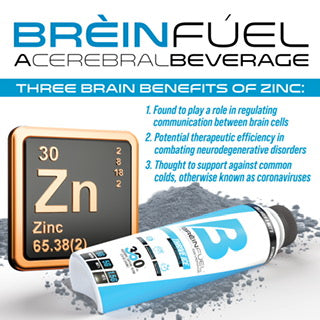The quest for greater health, alertness, and extended physical performance may seem to have reached an upper limit, with a host of nootropics, coffees, and energy drinks providing a range of experiences with, some say, “more branding than science.” However, that evolution may have recently turned a corner with what is known as functional, better-for-you, caffeinated beverages.
The connection between Zinc and caffeine is as potentially excellent as it has remained hidden from intense scrutiny or analysis because, by itself, caffeine and Zinc have very different functions. But in Breinfuel, caffeine includes green coffee beans and green tea leaf extracts, and therein lies an entirely new area of potential benefit. A very deliberate step was taken, adding Zinc, a key component of Breinfuel that will be the subject of this blog. First, let's discuss the properties of Zinc alone and then the very interesting potential Breinfuel may add.

Zinc is a trace element, studied in great detail, with numerous functions. It is not unusual to experience Zinc deficiency in diets lacking meat supplementation, such as vegan or vegetarian diets. In significant excess, Zinc has been associated with obesity and may be harmful to the liver. But rarely are very high doses of Zinc ingested. The daily requirement is about 9 mg for women and 11 mg for men.
A simple way to provide a base assessment of function is to determine the effects of deficiency, and for Zinc, these are substantial:
- Immune function altered host defense;
- Neurodegenerative disease (Parkinson’s, Alzheimer’s);
- Increased risk of pathogens;
- Adverse consequences in individuals predisposed to immune deficiency.
Zinc is also thought to be necessary for several positive associations:
- Improved memory, with high Zinc levels in the hippocampus of the brain;
- Has known antibacterial and antiviral activity;
- May play a role in the reduction of cognitive and behavioral deficits with traumatic brain injury (TBI), possibly only if present in a normal range pre-injury;
- Facilitates enzymatic reactions, including in the brain;
- Has been associated with a reduced risk of depression;
Other associations of Zinc with micronutrients, particularly Vitamin C and Vitamin E:
- May attenuate oxidative stress in burn victims;
- Associated with increased memory and decreased reaction time for reasoning tasks;
- May reduce cold symptoms as shown in studies versus placebo;
- A formulation is known as ARED, and ARED 2 has been shown to protect eye health, consisting of pigment (lutein, zeaxanthin), vitamin C (500mg), vitamin E ( 400 IU), Zinc oxide, and cupric oxide – used to help prevent macular degeneration an aging condition.
Zinc and Breinfuel: Zinc, vitamin C, vitamin E, and antioxidants are found in Breinfuel.
While Zinc alone has shown potential for reducing the risk of depression, accelerating memory, and possibly lessening to some degree the effects of a TBI, a host of benefits have been shown for this (above) and similar combinations, including, for example, beta-carotene (pigment) in AREDS formulations for vision protection of the macula. Breinfuel has its own very potent antioxidant pigment – those found in beetroot.
Perhaps the most intriguing, other than generally critical to optimizing brain function, is the effect of Zinc potentially as an antimicrobial. Whether it be bacteria or a virus, Zinc can, under certain circumstances, interrupt the explosive replication that occurs intracellularly – provided it can penetrate intracellularly. Usually, Zinc cannot easily penetrate a cell membrane. Medications have been identified that can do so via “active transport,” adding their potential side effects to the desired benefit of intracellular Zinc absorption (e.g., hydroxychloroquine, azithromycin).
Many compounds in our food supply can also facilitate that intracellular absorption, ranging from citric acid (found in fruits) to polyphenols (coffee/tea, green coffee beans, berries, nuts, vegetables, olive oil…). So intake of Zinc, preferably not more than 10 mg per day, plus attention to dietary factors that enhance its intracellular absorption, may improve your immunity to pathogens, bacterial, viral, or other. Remember, vegans and vegetarians may want to supplement their Zinc absorption.
Breinfuel has green coffee bean extract, high in a flavanol (antioxidant) with a particular flavonol known as quercetin, which has a high component of polyphenols through its green coffee bean and green tea extracts and uses citric acid to maintain its low pH. All of the above potentially can enhance Zinc absorption intracellularly. So unlike hydroxychloroquine, chloroquine, or medications like azithromycin that may add toxicity, Zinc may be able to penetrate cells and more effectively realize its potential to disrupt intracellular pathogens and virus life cycles through these Zinc promoters. These promoters are natural, meaning they can be added selectively to your diet - but are also present in Breinfuel. Part of the controversy around how effective Zinc may be as an antimicrobial, I believe to a great degree, relates to the failure or success of existing Zinc plasma levels to penetrate intracellularly. Breinfuel uses its green coffee bean extract base (quercetin and polyphenols), and other micronutrient Zinc promoters by adding Zinc at about 10% of the minimum daily requirement. The promoters enhance zinc in coffee beans, tea leaves, and other micronutrients in Breinfuel, plus Zinc in your system. The Zinc absorption enhancers in Breinfuel do not lose potency from heat sterilization due to Breinfuel’s low concentrations of preservatives, making heat unnecessary. As a result, Breinfuel may offer ways for Zinc to more effectively penetrate intracellularly than zinc supplements alone versus the marginal benefit of taking higher doses of zinc (which can contribute to obesity and liver toxicity) without intracellular promoter facilitation.
In summary, Zinc adds numerous potential benefits to brain and body function and adds all-star potential to Breinfuel’s stellar cast of ingredients. Its most fundamental accessory benefit beyond brain micronutrient support may be the potential to reduce the risk of pathogens establishing a successful foothold after entry to the body. Still, its myriad of potentially supportive brain functions makes it one of the workhorse “superheroes” of the ingredients in Breinfuel we love.
References:
https://www.sciencedirect.com/science/article/pii/S1756464612001867
https://www.tandfonline.com/doi/abs/10.1080/09637486.2018.1505834

